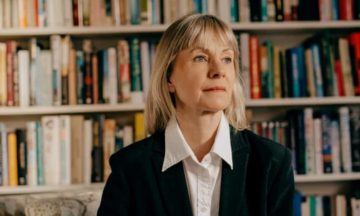Emine Saner in The Guardian:
 It was 10 years ago that Kate Mosse got the idea for her latest series of historical novels – and immediately tried to talk herself out of it. “I just thought: ‘Don’t do this, Kate – you know nothing about the French wars of religion, nothing about the 17th and 18th centuries. This whole history is obviously a minefield,” she recalls. Despite those initial reservations, she eventually embarked on what would become a quartet of novels about the French Protestants known as the Huguenots, beginning in 16th-century Languedoc with The Burning Chambers (published in 2018) and following the diaspora across two continents and three centuries. It’s not as if she had much else on – only a few other books, a couple of plays, keeping the Women’s prize for fiction going, railing against Brexit and being a carer.
It was 10 years ago that Kate Mosse got the idea for her latest series of historical novels – and immediately tried to talk herself out of it. “I just thought: ‘Don’t do this, Kate – you know nothing about the French wars of religion, nothing about the 17th and 18th centuries. This whole history is obviously a minefield,” she recalls. Despite those initial reservations, she eventually embarked on what would become a quartet of novels about the French Protestants known as the Huguenots, beginning in 16th-century Languedoc with The Burning Chambers (published in 2018) and following the diaspora across two continents and three centuries. It’s not as if she had much else on – only a few other books, a couple of plays, keeping the Women’s prize for fiction going, railing against Brexit and being a carer.
Even during the pandemic, she has been incredibly productive – the initial shock of it “felt like grief” she says, and she couldn’t concentrate on writing, so instead she read more than 250 golden age detective books. The City of Tears, the sequel to The Burning Chambers, should have been released in May last year and she would have spent much of 2020 promoting it; instead, she is now working on the third instalment of the series. And then she wrote another book, out later this year, about her role as a carer – first helping her mother look after her father, who had Parkinson’s and died in 2011, and now for her 90-year-old mother-in-law, Rosie. In order to protect Rosie, who lives with Mosse and her husband, Greg, the household has been virtually self-isolating since March.
Mosse’s move into historical fiction changed her life with the success of Labyrinth – a Holy Grail adventure story – in 2005, and the following two books in her Languedoc trilogy, so this return to the genre has felt exciting, she says. When her father was diagnosed, Mosse decided not to work on any research-heavy books that required long periods of travel, in order to support her parents – they also both lived with Mosse and her husband. “Sadly, my dad died in 2011 and then my ma died in 2014,” she says. “Then for a period of time, I could be back out, doing research, and it’s been a really lovely thing to have this huge project.”
More here.
